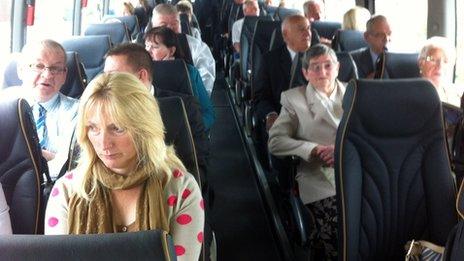Families of Kingsmills victims seek government apology
- Published

The relatives are travelling to Dubin to meet the Taoiseach Enda Kenny
Relatives of Kingsmills massacre victims are seeking an apology from the Irish prime minister for what they describe as the Irish Republic's "blatant inaction" over the killings.
Ten Protestant workers were murdered by the IRA in County Armagh in 1976. One man survived.
Last year, a report by the Historical Enquiries Team found the IRA was responsible.
It said the men were targeted because of their religion.
The relatives laid a wreath at a memorial to the victims in Bessbrook, County Armagh, before they boarded a bus to Dublin for a meeting with the Taoiseach, Enda Kenny later on Thursday.
Jacqueline Semple, the sister of victim Kenneth Worton, is one of those on board.
"We're not looking for compensation, we're looking for justice," she said.
"Kenneth was best man at my wedding and I was bridesmaid at his - not a day goes past when we don't think about him - down the years you kept your feelings quiet during the day and cried at night."
Karen Armstrong, whose brother John McConville was also murdered, said the families had a lot of questions for Mr Kenny.
"I certainly would expect recognition, even though symbolic, that the actions and the failures of the time were morally wrong and justify some expression of regret," she said.
"The governments at the time, in my opinion, did turn a blind eye to the Kingsmills murders in as far as they failed to discourage the perpetrators taking refuge in their border area at that time.
"It's time for honesty, it's time for openness to discuss this. Primarily we would like the taoiseach to acknowledge what happened."
On 5 January 1976, the textile workers were travelling home from work on a minibus in the heart of rural County Armagh.
Shortly after the van cleared the rise of a hill, they saw a man standing in the road flashing a torch.
They stopped and 11 other men, all armed, emerged from the hedges around them.
Their first thought was that it was the Army, but the gunmen were masked.
A man asked the men their religion. There was one Catholic on the bus. He was identified and ordered away from his Protestant work mates. He was able to run off.
Weapons
The 11 remaining men were then shot. One of them, Alan Black, survived the massacre, despite having 18 gunshot wounds.
Ulster Unionist MLA for Newry and Armagh Danny Kennedy, who will also be at the meeting, said it was important that the families told their stories.
"The IRA gang who murdered innocent Protestant workmen at Kingsmills operated from the Irish Republic," he said.
"It was in the Irish Republic that they kept their weapons and in the Irish Republic that they felt safe.
"Therefore, there was a failure on behalf of the Irish authorities, both the political authorities and the security authorities, to deal effectively with what was going on there.
"The very least we can expect and ask Enda Kenny, as the leader of the Irish Republic, is to acknowledge the failings, to accept the failings and to apologise for those failings, not on his own behalf, but on behalf of previous governments and on behalf of the Irish state."
The IRA never admitted involvement and was supposed to be on ceasefire at the time.
The South Armagh Republican Action Force claimed the deaths. The HET reinvestigated the killings as part of work spanning three decades of conflict.
- Published22 February 2012
- Published16 June 2011
- Published21 June 2011